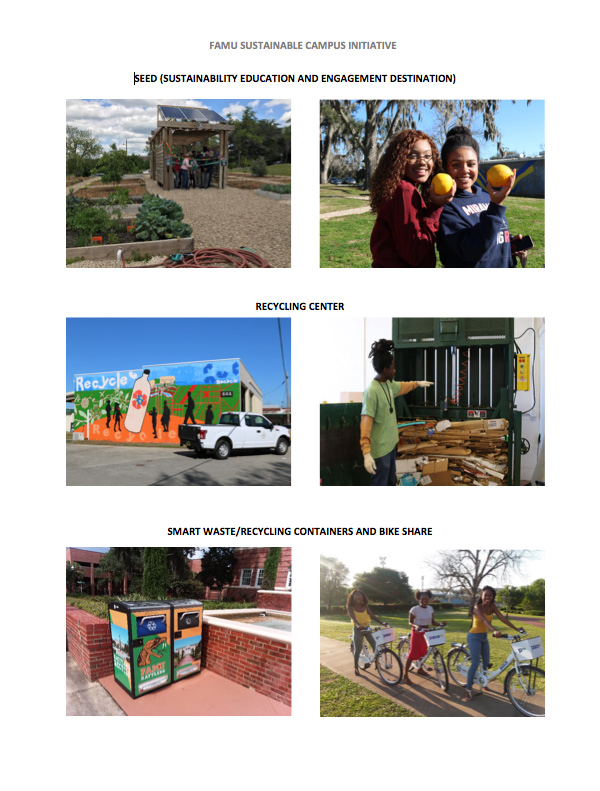« Return to FMDAA entries

Florida Agricultural and Mechanical University, Tallahassee, Fla. / Entry #2
Overview
Florida Agricultural and Mechanical University (FAMU) has enacted a sustainable campus initiative that cuts across campus divisions to reach the students it supports and the buildings it maintains, and that reaches across the divide of town and gown to support the low-income, African-American community that surrounds it.
FAMU has a holistic commitment to sustainability that stretches back to its founding in 1887, when it offered opportunities to African-Americans. Sustainability is integral to campus culture that is supported by faculty and staff and from the highest level of senior leadership to the grassroots student engagement. With efforts focusing on all three pillars of sustainability (social, environmental, financial) FAMU is now positioned to evolve as a seed bed of innovation and applied sustainability practices.
Guided by the creative and intellectual capital of its constituents and in the spirit of collective problem solving to chart a path towards sustainability, campus champions were identified and assigned to focus team. Teams worked on developing strategies in the areas of Better Building, Curriculum, Engagement, Food, People, Purchasing, Research, Transportation, and Waste. FAMU has adopted innovations that promote resource stewardship, social equality, and restoration of human and natural systems. Strategies are now in place to more deeply infuse sustainability into campus operations, community-based engagement, curriculum, and research.
Campus operations worked with resource stewardship sustainability by harnessing the efforts of the campus community and its public and private sector partners. This collaboration allows for a marked improvement in energy conservation and waste handling on campus, while offering opportunities for applied research, development of student talent, and financial savings. Driven by the passion of the in-house team, various initiatives of in house commissioning and retro-commissioning are performed.
Students, faculty members, and researchers are engaged through classroom presentations, research projects, and internship programs to assist and develop some of these energy and sustainability projects. Improvements are made to retrofit building systems, infrastructure operations, and upgrades to lighting system by supplementing in-house efforts and leveraging private sector expertise and financing.
These improvements have resulted in improved indoor environment and comfort, reduction in deferred maintenance, while reducing campus electric consumption by 17 percent and related costs by 25 percent during from 2010-18. The energy efforts have not only focused on the demand side but also on the generation or the source side. FAMU has committed to purchase a portion of their energy needs through the recently completed city of Tallahassee’s solar farm. FAMU has also partnered with Duke Energy to build a 75 megawatt solar farm on its 800-acre tract in Brooksville, Fla. This partnership not only enhances our sustainability profile but also provides much needed financial incentives, scholarships and internship opportunities for our students to learn about sustainability and alternative energy production.
FAMU is surrounded by economically distressed communities with limited access to fresh food. In an attempt to help the campus and surrounding communities, a hands-on engagement project, Eco-Lab or SEED (Sustainability Education and Engagement Destination) was created through a Home Depot grant and partnerships across the campus. This project not only serves as a non-traditional learning center and a place for positive community social interactions, but also provide educational demonstrations for the community on health, environmental conservation, food security, and other sustainability related initiatives. SEED serves as a seedbed for entrepreneurial possibilities related to gardening, composting, and generates opportunities for student and community engagement activities.
Improving student sustainability literacy will increase their abilities to address real-world solutions to environmental, economic and social challenges. FAMU students have the opportunity to learn about sustainability concepts in a diverse set of courses offered by a variety of disciplines, including Agriculture and Food Science, School of Environment, Engineering, Architecture, Technology, Construction Management, Pharmacy, and the Social Sciences. The integration of sustainability into the general education curriculum will have long-lasting impacts that ensure graduates are prepared to develop solutions to complex problems.
In addition, other projects have included water-bottle filling stations, smart waste/recycling containers, and partnership with the city and county to enhance transportation systems. Grassroots initiatives like campus cleaning, beautification, recycling center art/mural projects have been successfully completed with student government/organizations and green coalition partnership.
To enhance collaboration, FAMU has now joined the Capital Area Sustainability Council to continue the momentum, rolling out an initiative that is fueled by student energy, supported by administrative leadership, informed by faculty, supported by staff mentoring, and steered with private sector expertise. Ultimate ideals of social equality, regenerative social and material systems and land use, carbon neutrality, a circular economy, and zero waste will guide the way in striving for solutions.

In-House Participants
Sameer Kapileshwari, Dr. Kathryn Ziewitz, Michael Burriello, John Kimberl, Bruce Strouble, Bakari McClendon, Kendall Jones
↑ Back to top









